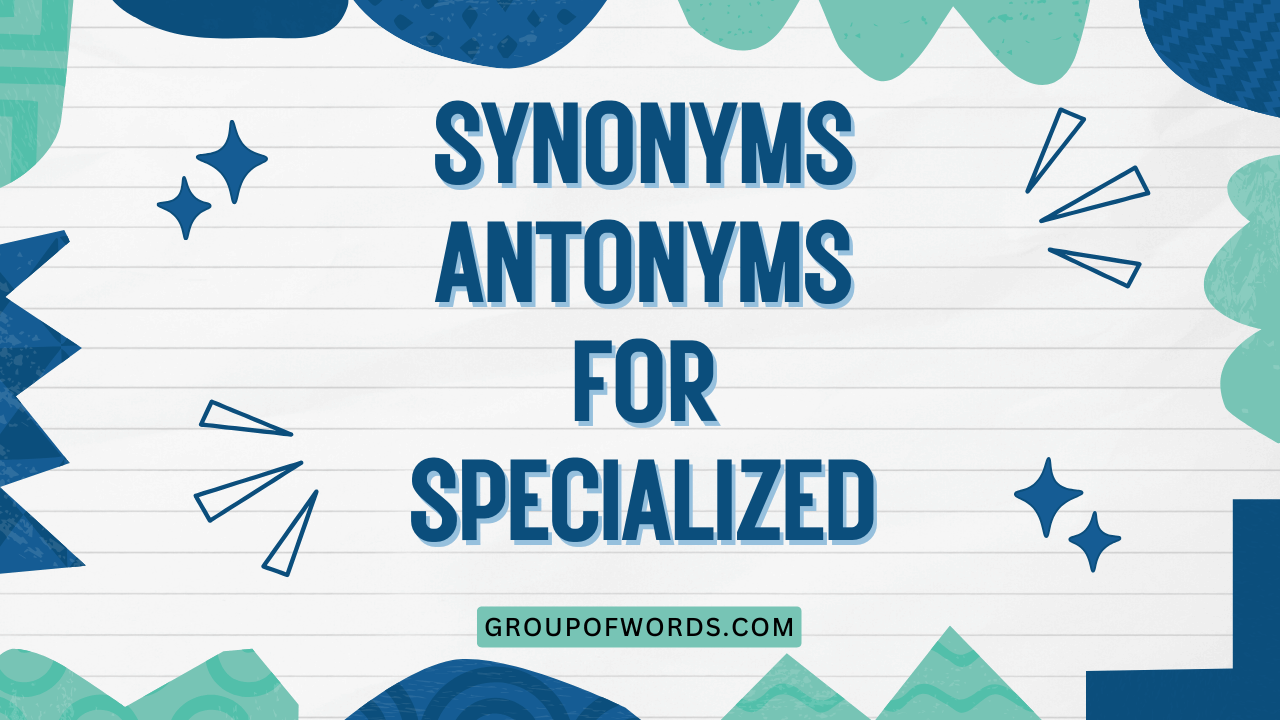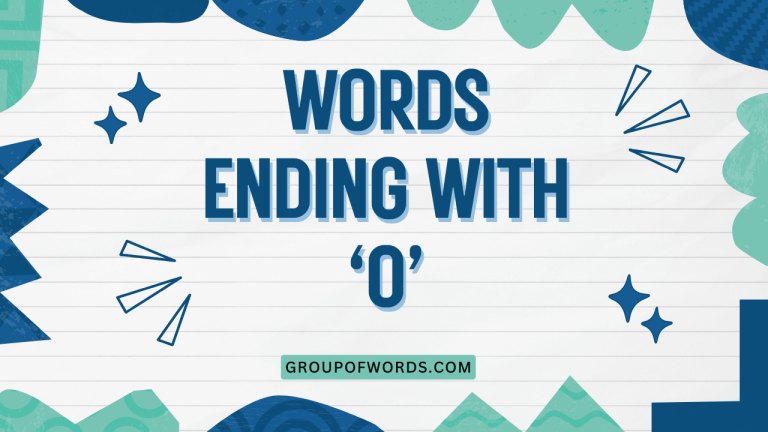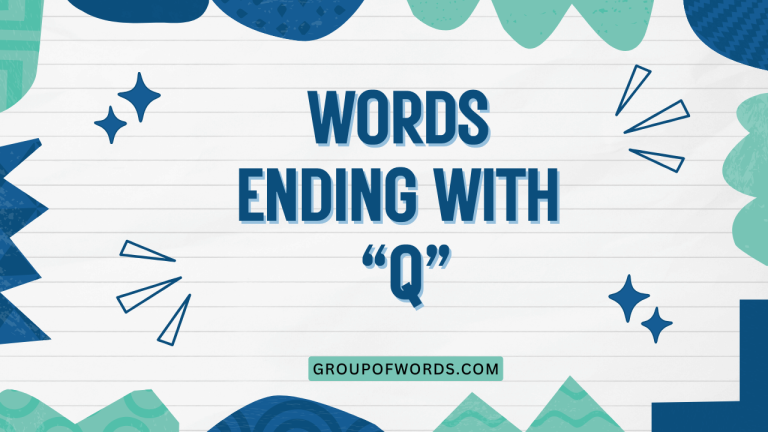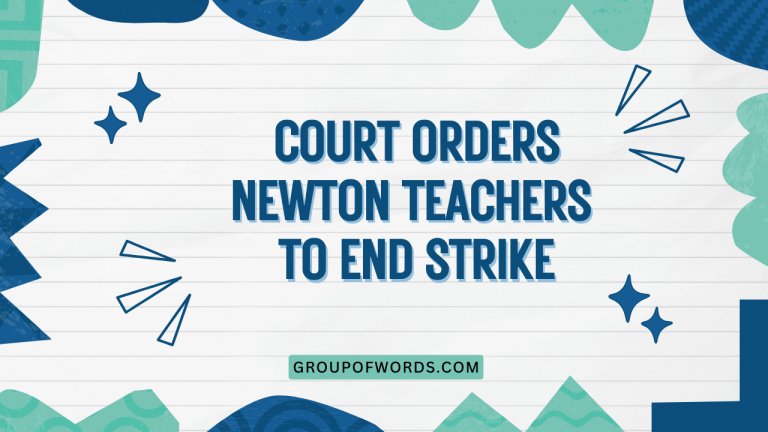Synonyms & Antonyms for “Specialized”: A Comprehensive Guide
Understanding synonyms and antonyms for the word “specialized” is crucial for enhancing your vocabulary and improving the precision of your writing and speaking. This skill allows you to express nuanced meanings and avoid repetitive language.
Whether you are an English language learner, a student preparing for exams, or a professional aiming to communicate more effectively, this guide will provide you with the necessary tools. We will explore various synonyms and antonyms, examine their usage in different contexts, and offer practical exercises to solidify your understanding.
This article is designed to be accessible to learners of all levels, from beginners to advanced speakers. By the end of this guide, you will have a comprehensive understanding of how to use synonyms and antonyms for “specialized” to enrich your vocabulary and improve your overall communication skills.
Table of Contents
- Definition of “Specialized”
- Structural Breakdown of “Specialized”
- Types and Categories of Synonyms and Antonyms
- Examples of Synonyms and Antonyms in Sentences
- Usage Rules for Synonyms and Antonyms
- Common Mistakes When Using Synonyms and Antonyms
- Practice Exercises
- Advanced Topics
- Frequently Asked Questions
- Conclusion
Definition of “Specialized”
The term “specialized” describes something that is designed or developed for a particular purpose, task, or area of knowledge. It implies a focus on a specific domain, often requiring expertise or training.
“Specialized” can refer to skills, equipment, knowledge, or services that are tailored to meet specific needs or requirements.
In essence, “specialized” means being proficient or adapted to a particular field or function. It suggests a level of detail and precision that goes beyond general or common applications.
Understanding this core meaning is essential for grasping the nuances of its synonyms and antonyms.
The word “specialized” can function as an adjective or a verb. As an adjective, it modifies nouns, describing them as having a specific focus.
As a verb, it means to become expert in a particular subject or skill.
Structural Breakdown of “Specialized”
The word “specialized” is derived from the verb “specialize,” which comes from the adjective “special.” The root “spec-” is related to seeing or observing, which evolved to mean focusing on a particular aspect. The suffix “-ize” turns the adjective “special” into a verb, meaning “to make special” or “to focus on a particular area.” The addition of “-ed” transforms the verb into a past participle, which can be used as an adjective.
Breaking down the word structure helps in understanding its meaning and usage. The core idea is about focusing on a specific aspect or area, making something distinct or tailored for a particular purpose.
This understanding aids in selecting appropriate synonyms and antonyms that accurately convey the intended meaning.
The word follows a clear morphological pattern: special (adjective) → specialize (verb) → specialized (past participle/adjective). Recognizing this pattern can assist in understanding related words and their meanings.
Types and Categories of Synonyms and Antonyms
Synonyms and antonyms for “specialized” can be categorized based on the specific nuance they convey. For synonyms, we can distinguish between words that emphasize expertise, focus, or adaptation.
For antonyms, we can differentiate between words that suggest generality, commonality, or lack of focus.
Synonyms for “Specialized”
Synonyms for “specialized” can be grouped into several categories:
- Expertise: Emphasizing a high level of skill or knowledge (e.g., expert, skilled, proficient).
- Focus: Highlighting the concentration on a specific area (e.g., dedicated, concentrated, specific).
- Adaptation: Indicating that something is tailored for a particular purpose (e.g., customized, tailored, adapted).
- Technicality: Referring to the use of specific techniques or processes (e.g., technical, sophisticated, intricate).
Antonyms for “Specialized”
Antonyms for “specialized” can also be categorized:
- Generality: Suggesting a broad or common application (e.g., general, common, universal).
- Simplicity: Implying a lack of complexity or sophistication (e.g., simple, basic, elementary).
- Lack of Focus: Indicating a lack of concentration on a specific area (e.g., unspecific, undifferentiated, broad).
Examples of Synonyms and Antonyms in Sentences
To illustrate the usage of synonyms and antonyms for “specialized,” let’s examine various examples in sentences. These examples will help you understand how to use these words in context to convey your intended meaning effectively.
Examples of Synonyms
The following table provides examples of synonyms for “specialized” used in different sentences. Each synonym offers a slightly different nuance, allowing for more precise communication.
| Original Sentence | Synonym | Sentence with Synonym |
|---|---|---|
| The doctor has a specialized knowledge of cardiology. | Expert | The doctor has an expert knowledge of cardiology. |
| This tool is specialized for removing splinters. | Designed | This tool is designed for removing splinters. |
| The software is specialized to meet the company’s needs. | Customized | The software is customized to meet the company’s needs. |
| She received specialized training in forensic science. | Dedicated | She received dedicated training in forensic science. |
| The museum has a specialized exhibit on ancient Egypt. | Specific | The museum has a specific exhibit on ancient Egypt. |
| The team requires specialized equipment for the mission. | Technical | The team requires technical equipment for the mission. |
| The company offers specialized services for small businesses. | Tailored | The company offers tailored services for small businesses. |
| He is a specialized consultant in the field of renewable energy. | Proficient | He is a proficient consultant in the field of renewable energy. |
| The course provides specialized instruction in data analysis. | Intensive | The course provides intensive instruction in data analysis. |
| The factory uses specialized machinery for precision manufacturing. | Sophisticated | The factory uses sophisticated machinery for precision manufacturing. |
| The researcher has a specialized interest in marine biology. | Focused | The researcher has a focused interest in marine biology. |
| The hospital provides specialized care for cardiac patients. | Advanced | The hospital provides advanced care for cardiac patients. |
| The athlete underwent specialized conditioning for the competition. | Targeted | The athlete underwent targeted conditioning for the competition. |
| The library has a specialized collection of rare books. | Exclusive | The library has an exclusive collection of rare books. |
| The chef is known for his specialized knowledge of French cuisine. | In-depth | The chef is known for his in-depth knowledge of French cuisine. |
| The software offers specialized tools for graphic design. | Particular | The software offers particular tools for graphic design. |
| The engineer has specialized skills in structural engineering. | Refined | The engineer has refined skills in structural engineering. |
| The company provides specialized solutions for environmental challenges. | Specific | The company provides specific solutions for environmental challenges. |
| The course offers specialized training in web development. | Detailed | The course offers detailed training in web development. |
| The department has specialized equipment for scientific research. | Advanced | The department has advanced equipment for scientific research. |
This table illustrates how different synonyms can be used to replace “specialized” while maintaining the original meaning of the sentence. The choice of synonym depends on the specific context and the nuance you want to convey.
Examples of Antonyms
The following table provides examples of antonyms for “specialized” used in different sentences. Each antonym conveys the opposite meaning, indicating a lack of specific focus or expertise.
| Original Sentence | Antonym | Sentence with Antonym |
|---|---|---|
| The tool is specialized for a specific task. | General | The tool is general and can be used for many tasks. |
| She has specialized knowledge in a narrow field. | Basic | She has basic knowledge in many fields. |
| The course offers specialized training in one area. | Broad | The course offers a broad overview of several areas. |
| The company provides specialized services for a niche market. | Universal | The company provides universal services for all markets. |
| The equipment is specialized for a particular experiment. | Common | The equipment is common and can be used for various experiments. |
| The software has specialized features for advanced users. | Simple | The software has simple features for beginners. |
| He is a specialized doctor in a rare disease. | General | He is a general doctor who treats common ailments. |
| The museum has a specialized exhibit on a specific artist. | Comprehensive | The museum has a comprehensive exhibit on various artists. |
| The training is specialized to meet specific requirements. | Generic | The training is generic and suitable for everyone. |
| The product is specialized for a single purpose. | Versatile | The product is versatile and can be used for multiple purposes. |
| The approach is highly specialized and tailored to individual needs. | Standard | The approach is standard and applied uniformly. |
| The machine is specialized for high-precision tasks. | Ordinary | The machine is an ordinary one used for everyday tasks. |
| The research is specialized in a very narrow area. | General | The research is general covering a broad area. |
| The consultant offered specialized advice. | Basic | The consultant offered basic advice. |
| The curriculum is specialized for advanced learners. | Elementary | The curriculum is elementary for beginners. |
| The software provides specialized functions for experts. | Rudimentary | The software provides rudimentary functions for novices. |
| The firm offers specialized services in a niche market. | Comprehensive | The firm offers comprehensive services in all markets. |
| The department has specialized equipment for a single task. | Multipurpose | The department has multipurpose equipment. |
| The program is specialized for coding. | Generalized | The program is generalized. |
| She has specialized training. | Unspecific | She has unspecific training. |
This table demonstrates how antonyms can be used to convey the opposite meaning of “specialized,” indicating generality, simplicity, or a lack of specific focus.
Usage Rules for Synonyms and Antonyms
When using synonyms and antonyms for “specialized,” it is important to consider the context and the specific nuance you want to convey. Here are some key rules to follow:
- Context is Key: Choose synonyms and antonyms that fit the specific context of your sentence. Consider the surrounding words and the overall meaning you want to communicate.
- Nuance Matters: Be aware of the subtle differences in meaning between different synonyms. Select the word that most accurately reflects your intended meaning.
- Avoid Repetition: Use synonyms to avoid repeating the word “specialized” too frequently in your writing. This will make your text more engaging and varied.
- Consider Formality: Some synonyms and antonyms may be more formal or informal than others. Choose words that are appropriate for your audience and the tone of your writing.
- Check for Accuracy: Always double-check the meaning of a synonym or antonym before using it. Ensure that it accurately conveys your intended meaning and does not introduce any unintended connotations.
Understanding these rules will help you use synonyms and antonyms for “specialized” effectively and accurately.
Common Mistakes When Using Synonyms and Antonyms
Many learners make common mistakes when using synonyms and antonyms for “specialized.” Here are some frequent errors and how to avoid them:
| Incorrect | Correct | Explanation |
|---|---|---|
| The general tool is specialized for cutting wood. | The specialized tool is for cutting wood. | Using an antonym (“general”) incorrectly in place of “specialized.” |
| She has simple knowledge of cardiology. | She has specialized knowledge of cardiology. | Using an antonym (“simple”) when the intended meaning is “specialized.” |
| The universal software is specialized for graphic design. | The specialized software is for graphic design. | Using an antonym (“universal”) incorrectly, creating a contradictory statement. |
| The broad training is specialized for a specific task. | The specialized training is for a specific task. | Using an antonym (“broad”) where a synonym or “specialized” itself is more appropriate. |
| The expert equipment is general. | The specialized equipment is versatile. | Incorrectly combining synonyms and antonyms in a contradictory way. |
Avoiding these common mistakes will improve the accuracy and clarity of your writing and speaking.
Practice Exercises
Test your understanding of synonyms and antonyms for “specialized” with these practice exercises.
Exercise 1: Choose the best synonym for “specialized” in each sentence.
| Question | Options | Answer |
|---|---|---|
| The doctor has a specialized knowledge of dermatology. | a) general b) expert c) basic | b) expert |
| This software is specialized for video editing. | a) universal b) designed c) simple | b) designed |
| The course offers specialized training in marketing. | a) broad b) dedicated c) generic | b) dedicated |
| The company provides specialized services for large corporations. | a) common b) tailored c) versatile | b) tailored |
| The equipment is specialized for scientific research. | a) ordinary b) technical c) basic | b) technical |
| He is a specialized consultant in finance. | a) proficient b) unspecific c) simple | a) proficient |
| The museum has a specialized exhibit on ancient artifacts. | a) specific b) comprehensive c) common | a) specific |
| The training is specialized to meet industry standards. | a) generic b) intensive c) broad | b) intensive |
| The product is specialized for a single application. | a) versatile b) particular c) universal | b) particular |
| The approach is specialized and unique. | a) standard b) refined c) generalized | b) refined |
Exercise 2: Choose the best antonym for “specialized” in each sentence.
| Question | Options | Answer |
|---|---|---|
| The tool is specialized for a particular task. | a) general b) expert c) specific | a) general |
| She has specialized knowledge in a narrow field. | a) broad b) expert c) dedicated | a) broad |
| The course offers specialized training in one area. | a) common b) tailored c) generic | c) generic |
| The company provides specialized services for a niche market. | a) universal b) technical c) specific | a) universal |
| The equipment is specialized for a particular experiment. | a) simple b) common c) sophisticated | b) common |
| The software has specialized features for advanced users. | a) broad b) simple c) expert | b) simple |
| He is a specialized doctor in a rare disease. | a) generic b) general c) proficient | b) general |
| The museum has a specialized exhibit on a specific artist. | a) comprehensive b) tailored c) technical | a) comprehensive |
| The training is specialized to meet specific requirements. | a) generic b) intensive c) broad | a) generic |
| The product is specialized for a single purpose. | a) versatile b) particular c) technical | a) versatile |
Exercise 3: Rewrite the following sentences using a synonym for “specialized.”
- The doctor has a specialized practice in pediatrics. (Answer: The doctor has an expert practice in pediatrics.)
- This equipment is specialized for laboratory use. (Answer: This equipment is designed for laboratory use.)
- The software provides specialized tools for data analysis. (Answer: The software provides specific tools for data analysis.)
- She received specialized training in computer science. (Answer: She received dedicated training in computer science.)
- The company offers specialized services for small businesses. (Answer: The company offers tailored services for small businesses.)
- The team requires specialized gear for the mission. (Answer: The team requires technical gear for the mission.)
- The consultant is specialized in renewable energy. (Answer: The consultant is proficient in renewable energy.)
- The course provides specialized instruction in web development. (Answer: The course provides intensive instruction in web development.)
- The factory uses specialized machinery for precision work. (Answer: The factory uses sophisticated machinery for precision work.)
- The researcher has a specialized interest in climate change. (Answer: The researcher has a focused interest in climate change.)
Advanced Topics
For advanced learners, understanding the nuances of connotation and context is crucial. Some synonyms may have subtle differences in meaning or emotional tone.
For instance, “bespoke” and “customized” are both synonyms for “specialized,” but “bespoke” often implies a higher level of craftsmanship and luxury.
Additionally, exploring the etymology of words can provide deeper insights into their meanings. Understanding the origins of “specialized” and its related terms can enhance your appreciation for the evolution of language and the subtle shades of meaning they convey.
Another advanced topic is the use of “specialized” in technical and academic writing. In these contexts, precision is paramount, and the choice of synonyms and antonyms must be carefully considered to avoid ambiguity or misinterpretation.
Frequently Asked Questions
Here are some frequently asked questions about synonyms and antonyms for “specialized”:
- What is the difference between “specialized” and “specific”?
While both words imply a focus on a particular area, “specialized” suggests a higher level of expertise or adaptation, while “specific” simply indicates that something is clearly defined or identified.
- How can I improve my vocabulary of synonyms and antonyms?
Read widely, use a thesaurus regularly, and practice using new words in your writing and speaking. Pay attention to the context in which words are used and try to identify subtle differences in meaning.
- Are there any online resources for finding synonyms and antonyms?
Yes, there are many online resources, such as Merriam-Webster’s Thesaurus, Thesaurus.com, and Oxford Learner’s Dictionaries. These resources can help you find a wide range of synonyms and antonyms for any word.
- How important is it to use synonyms and antonyms correctly?
Using synonyms and antonyms correctly is crucial for clear and effective communication. Incorrect usage can lead to misunderstandings and weaken the impact of your message.
- Can the meaning of “specialized” change depending on the context?
Yes, the meaning of “specialized” can vary slightly depending on the context. For example, in a medical context, “specialized” might refer to a particular area of medicine, while in a business context, it might refer to a niche market or a specific product.
- Is it better to use a common synonym or a more obscure one?
It depends on your audience and the purpose of your writing. If you want to ensure that your message is easily understood, it is generally better to use a common synonym. However, if you want to add nuance or sophistication to your writing, you might choose a more obscure synonym, but be sure your audience will understand it.
- What are some common prefixes and suffixes that can change the meaning of “specialized”?
Prefixes like “un-” (unspecialized) and suffixes like “-ly” (specializedly) can alter the word’s meaning and function.
- How can I ensure that I’m using the right synonym in my writing?
Always consider the context of your sentence and the specific nuance you want to convey. Use a thesaurus to find potential synonyms, but then check the definitions of those synonyms to make sure they accurately reflect your intended meaning. If possible, ask a native speaker or a language expert to review your writing.
Conclusion
Mastering synonyms and antonyms for “specialized” is an essential step in enhancing your English vocabulary and improving your communication skills. By understanding the nuances of different words and their usage in various contexts, you can express yourself more precisely and effectively.
This guide has provided you with a comprehensive overview of synonyms and antonyms for “specialized,” along with practical examples and exercises to solidify your understanding.
Remember to consider the context, nuance, and formality when choosing synonyms and antonyms. Practice using these words in your writing and speaking to become more confident and fluent in your communication.
Continue to expand your vocabulary by reading widely and using resources like thesauruses and dictionaries. With consistent effort, you can master the art of using synonyms and antonyms to enrich your language skills.
By continually refining your understanding and application of these vocabulary tools, you can elevate your communication to a more sophisticated and nuanced level.






